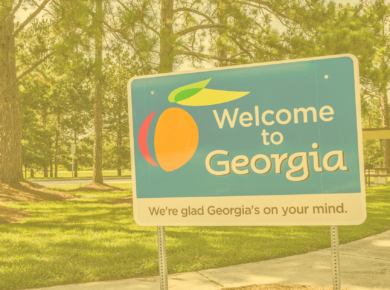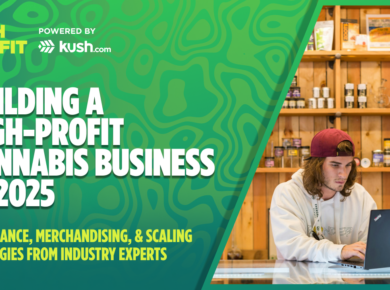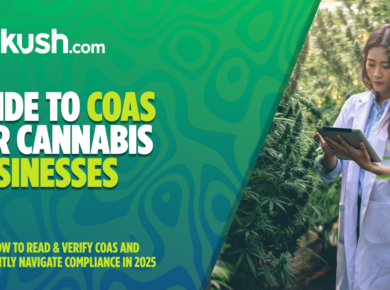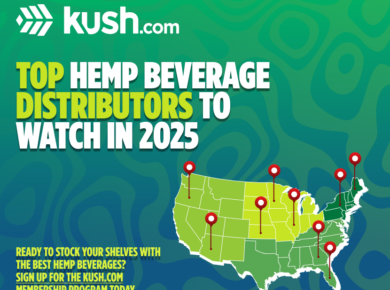Here’s a quick wrap up of the episode, and some links where you can watch the full length interview..
Watch the Full Interview (Just Hit Play)
Or listen to the Audio on Spotify and other podcast apps;
Subscribe for more Interviews each week!
In Summary
Everest Holmes of Carroll Botanicals joins us on the HempList this week, hosted By Chase Nobles, Founder of Kush.com
Everest and Carroll Botanicals has a ton to share about growing organic from Eastern North Carolina. Chase and Everest get specific in this interview going into how Carroll Botanicals dealt with water drainage in NC, organic pest prevention, and even how they are growing other plants like Sage, Rosemary, Bamboo, ext to benefit the hemp farm!
Subscribe for more interviews each week, also available on Spotify and podcast apps. Learn more and create your account now at Kush.com for B2B transactions or shop.kush.com for online orders.
Transcript (Auto-Generated)
hey everybody chase nobles here
co-founder of kush.com today i’ve got
everest holmes from carroll botanicals
with us today how are you ever
doing good thank you good to have you on
the sh
yeah i’m happy to have you happy to have
you on the show now it sounds like you
had a hell of a year growing out there
in north carolina
what’s it been like how’s how’d the
season treat you well
uh yeah last year i mean well we started
out with the pandemic
basically the lockdown hit so there was
a lot of
you know adjusting to that trying to
figure out can we do this
is this going to be too dangerous is it
you know but we just went ahead and did
it
and i got involved with an investment
group
and and we started up carroll botanicals
and um
it’s been going good we planted about 20
acres of hemp
last year outdoors and i’ve got our
genetics from
blue forest farm in colorado we’re doing
some exotic genetics hot blonde and
queen dream
uh feminized and and the they turned out
great um they did well here
uh you know we definitely had our issues
related to humidity
um being in in you know the southeastern
u.s
but we were able to pull it off and
got quite a big haul
harvested some outdoor smokeable quality
surprisingly and um and then
the rest to biomass and so we’re making
a lot of different products out of it
uh we’re involved we’ve we’ve got our
own co2 extractor it’s kind of small
scale
but um you know there’s other extractors
around that we’ve been able to
team up with and go ahead and
get get bulk extracted so that we can
start making products and we
we have a big vision and we’re just
starting out with
um hoping that it can it can kind of uh
be something that we’ll be able to
reinvest in in our and grow
slowly grow our business naturally um
[Music]
yeah so right on and so what part of
north carolina are you in
we’re in eastern north carolina the
coastal piedmont
and um so you know it’s and i’m actually
coming from the mountains uh where i was
growing before
so different climate different um you
know
hydro geology and everything and
so it was it was you know neat to see
the differences there but um
yeah eastern north carolina towards the
coast about an hour from the coast
so hurricanes are a little bit of an
issue we did have to contend with last
year
um you know especially with hemp not
liking wet feet
so drainage drainage everything that was
a big
big take home is prepare the drainage
systems way in advance
so they can handle a lot of water right
so i imagine you know it has to be north
carolina has two
very different climates you got kind of
the whole coastal section and then
you’ve got the appalachian mountains
right
where it’s a little bit you get a little
bit more uh
i i would say a little bit less humidity
still humid right
but yeah i would imagine that drainage
would be a pretty big challenge
so um for anybody growing in that area
what what did you all do to
to to to keep the the roots you know
from sitting in a puddle of water what
was the strategy there
yeah well um well ditches
deep ditches deeper than you think you
need to go
um and and because you’re moving land
you got to really think about
what the repercussions of that are
erosion wise and everything
another another really important one
that isn’t necessarily thought of right
off the bat
is row orientation and and how you’re
gonna if you
you know even on flat coastal land like
we are
you do need to think about um you know
with the small slopes and then
small slopes can actually have a big
impact on water catchment
and and then two you know understanding
what’s going on below the soil surface
because we grow in really sandy silty
loam but um you know
only about a couple feet down is a clay
pan
and one thing i’m very interested in is
is natural farming and learning how to
regenerate the soil learning how to
identify basically pathogens
and pests that are and weeds
so that we can take a more organic
approach with
less herbicide less pesticide
or no pesticide um we use biological
controls for pests
and that’s been going really well i
could talk about that
we we also looking at
beneficial microorganisms to amend our
soil
and form those associations with the
plants
so that they’re actually doing a lot of
the work of mineralizing
nutrients and into
organically available forms so that we
don’t have to rely on synthetics because
that’s a lot of
a lot of the movement that’s sort of
happening right now in the regenerative
agriculture scene is
is to completely uh stop
using synthetic fertilizers in an
outdoor
setting because it it is showing a high
correlation and cause a causal effect of
killing the soil microbiology which
then leads to problems so
like the hard pan and so with
you know kind of the sandier soil that
you have out there
what do you do to get the nutrients into
the soil that the plant needs because
hemp
takes a lot out of the soil yeah
right yes but we’re actually using
neptune’s harvest and i
i got to give them a shout out they’re
it’s a really simple fertilizer and you
may have heard of it
neptune’s harvest they take um they take
uh
fish emulsion basically fish guts and
everything
and blend it and stabilize it
and it has a really well-rounded balance
they have different products depending
on what flour
you know veg flour um or whatever stage
you’re in but
uh but it gives it gives a very
well-rounded
uh balance of macro and micronutrients
to feed the plants so and and and
you don’t need as much and a lot of the
reason you don’t need as much is because
organic matter breaks down with the
introduction of beneficial microbes
um providing things like nitrogen and i
mean nitrogen is free and abundant in
the air it’s just about how do you get
the plants to take that nitrogen
out of the air and it comes back to the
microbes again
and so what kind of microbes are you
using you know i had a company
that did a mycorrhizae yeah in the soil
are you using any fungi um but also
yeah what other kind of microbes are you
introducing into the soil to
you know get the quality up higher yeah
so we
we um we’ve tried out a number of
different products
and the one that we have the best
results with and i have some good
evidence of is uh is is called great
white
great white beneficial mycorrhizae with
trichoderma
and trichoderma is well there’s a fly
trichoderma is a pretty cool one it’s
actually a way of
of hemp being able to fix their own
nitrogen like we’re just talking about
so
so trichoderma are not
the type of bacteria that that fix
nitrogen
in the way that legumes do like peas or
beans
they they have a different type of um
of bacteria that that associates with
their roots
and will actually fix nitrogen
directly from uh from the plants
drawing it up and trading it for sugars
and such
but the um trichoderma are actually
going to be um build
basically converting nitrogen from
organic matter in the soil
locally around the roots not not
it is symbiotic but it’s not um it’s
it’s not
a uh
it’s not um where where they’re
feeding and trading off of the roots the
trichoderma are more so
breaking down living in that root system
as a
um as a micro environment and then
providing that nitrogen organically as
they
multiply decompose and
and convert organic matter so yeah
a lot of what i’ve discovered is adding
organic matter
to the soil is big especially in sandy
soil
and clay soil too they’re all both of
those extreme types of soil are missing
organic matter often that that can help
retain nutrients
that are organically available but also
convert
helping to convert and provide a home
for microbes that carbon
so right and so speaking of
you know kind of maintaining the quality
of the plant and i see a couple of flies
flying around
so you’ve got this you’ve got this real
healthy soil yeah you’ve got all these
beautiful plants growing
that’s going to attract pests yes how do
you how do you manage that because it’s
not something that you can
you know just hope doesn’t happen right
if you have a healthy garden
pests are going to come and so what do
you do to manage that
yeah well uh one one thing is is having
healthy plants i mean
the most important thing is to have is
to to give your plants the best start
so when they’re going you know from the
seedling stage
that’s almost just like with with
animals adult
adult people are often um
to compare animals to plants but
uh you know we form a lot
in of of our habits and our
our genetic expressions when we’re young
and those and we’re very malleable
when we’re young same with with
seedlings i mean
seedlings are very very sensitive to
abiotic and biotic factors
but um you know so so those things can
influence as i’m sure you’ve probably
experienced
too um you know one one little factor
can
alter the phenotypes of your plants
especially with hemp being such a
nucleus newly
stabilized genetic strains they’re
they’re still a little bit
unstable and so we just try to
really really give a lot of attention
early on
to all the factors so that they’re
healthy as possible when they go in the
ground
managing those abiotic environment
factors is huge
so um and how do we manage the biotic
factors is
we we’ve used a lot of biological
controls
um you need a diversity of biological
controls you can’t just rely on one
parasitic bacteria or something like
that
but but a lot of these bio controls are
are it’s a it’s a booming industry right
now um
rapidly growing my favorite company is
marone bio innovations
and they have specifically done research
on
on hemp uh to to manage pests
and so we’re using uh certain types of
bacteria
that are sprayed on foliarly and
that and they basically infect insects
that that eat the plants
and it’s and it’s pretty effective it’s
it’s highly effective
uh it does require some rotation of
of use so we have like three different
products that are going to target the
same insects
but that way you know the insects
because they breed so much they they
aren’t going to
they’re not going to be able to keep up
with um that
you know mutating to be resistant to
those bacteria
and but a lot of these a lot of these uh
bio
insecticides that are that are coming
out on the market
especially like i said marone bio
innovations they got really good
products
um for bio controls so so it sounds like
you have a really high quality flower
um high quality plant that you’ve been
able to harvest
and uh you know portion of it into flour
you know probably the
tops and things like that and a fair
amount biomass
pesticide free healthy soil yes um
you know high quality in the market but
it also looks like you’re taking a look
at
lavender some herbs some uh
giant giant bamboo tell us what else you
got going on over there because it
sounds like a pretty interesting farm
yeah well we really believe it’s
important to diversify and we’re trying
to
we’re trying to change um the view of
farming in
in our own little way uh to to
be um more
incorporate more uh natural systems
again so like
that even back to the pest controls the
lavender
and and rosemary for example and oregano
not only are they going to be cash crops
for us but they’re also
serving ecological uh roles
where where they’re they’re helping to
repel
pests they’re helping to attract
beneficial insects
artificial insects are all predators
they’re not herbivores the herbivores
are the
are are the bad insects that we’re
trying to kill
so when we bring in when we reduce
chemical pesticide use and we actually
bring in beneficials by
um through attracting them with plants
then we’re creating an ecosystem that’s
uh self-contained and uh or not
self-contained but but more
self-regulating and so yeah you bring in
predator
insects um because you’re attracting
other insects so it’s it’s not so our
frame of mind is
is um to be diverse and
and that’s not only going to help us win
the price of hemp
tanks you know like it did last year but
also when
um you know we have
we have uh the need to
stay away from um you know
conventional methods right and for
you know you know kind of one of the
mottos of carroll botanicals is the seed
to shelf
yeah um understanding the farming and
all the background that you have and
everything that you’ve done there
what products are you actually taking to
the shelves is if people find a carol
botanicals
product you know in this in their local
store
what products might they see as far as
the lineup goes sure well right now
we uh we we just launched in 2020
and um we have smokable blunt
cones pre-rolled cones we have
um jarred greenhouse indoor
and we have and then we have our extract
products so we have a whole line of
tinctures
we also got the water soluble tinctures
down which we’re really excited about
so we’re nano emulsifying which
as a as a tincture it becomes more
available to um
to to the human when when ingested and
so we’re also
going to be launching a line of
animal products so we’re looking at
horses and and pets
as as a market for our water tinctures
our water based tincture
we’ve got some green tea lotion some
lavender lotion
right now we outsource the green tea and
lavender because we just started growing
it
but in the future we plan on
incorporating those for example
so um have you been able to take your
co2 machine and put any herbs or
or anything like that in there to to
make you know the essential oils of
oh we absolutely will we absolutely will
and can
and we’re yep we’ve uh we’ve had to
master that system
um getting it down with the cbd
extraction
uh but it has a lot of potential for
terpene extraction co2
right right you know a lot of people
don’t realize separate fractions
these machines weren’t originally
created for hemp there
a lot of them were created to extract
everything from vanilla to lavender
so to be able to pull that you know as a
machine in and have those
types of products to be able to make uh
finished goods with could be really
interesting and be exciting to see
you know a multi-ingredient farm
producing fitness goods
yes exactly and and another another kind
of extract product that’s becoming
really popular these days
in the wellness communities are are our
medicinal mushroom extracts so mushrooms
like
rishi or
or or cordyceps militarists
those are those are now a lot of
gaining popularity um as for
for the benefits that they provide and
so
you know that’s another one we’re
looking at you know not just oh you’re
thinking about doing mushrooms
are you growing mushrooms already are
you farming mushrooms already
oh well no not not right now but but it
is on the back burner you know
yeah right so no it couldn’t be too wild
to spin that up and that would be a lot
of fun to see
that many different products come out of
one farm now um
you know kind of what what’s the plan
you know
in addition to these other crops where
where are you all looking to go over the
next year or two years how do you all
think
strategically about where the hint
market is going where the wellness
market is going
and where the farming industry is
sure well as we all know
it it does take a lot to get to the
point of sale
with him and and and we’re all still
biting our nails waiting to see
how the how the legislation goes and
everything like that but right now in
north carolina they
allowed us to go back to the 2014 farm
bill
so luckily here smokeable flour did not
get banned
um delta eight is also not banned yet
and we are going to be
uh getting into that as well with the d8
water soluble
um look we are looking to be a
wholesaler
we have that potential based on how much
land we have
and our resources and
so but we want to gross we want to grow
you know slow
and organically um in in terms of
scaling up
and so we don’t overextend but uh i’d
say in the next
year we plan on on wholesaling
um as many clients as we can
we we have the inventory for it and we
have
yeah like i said a lot of different
products from
beauty like um creams massage oils
to the tinctures and smokes
well we would like to again starting out
with hemp but
but then you know maybe um you know
and and all these crops are long-term
crops so we’re playing we’re sticking it
out for the long game we’re here to stay
um we’re going to make it work and uh
but we’re really in that beginning
startup stage
as of 2021 with our first crop being 20
20.
congratulations next round on the ground
yep yeah congratulations on
you know doing all that and having the
next harvest in the ground
already having all these finished goods
coming to the market it’s it’s truly
impressive if anybody’s looking for
some natural healthy products
to bring into their uh to bring in their
homes carol botanicals
sounds like a great fit and it’s
exciting to have you on the platform
can’t wait to see your products and uh
good luck with everything appreciate you
coming on the show
thank you very much i really appreciate
it yeah all right everest
appreciate your time we’ll talk soon
talk soon bye




